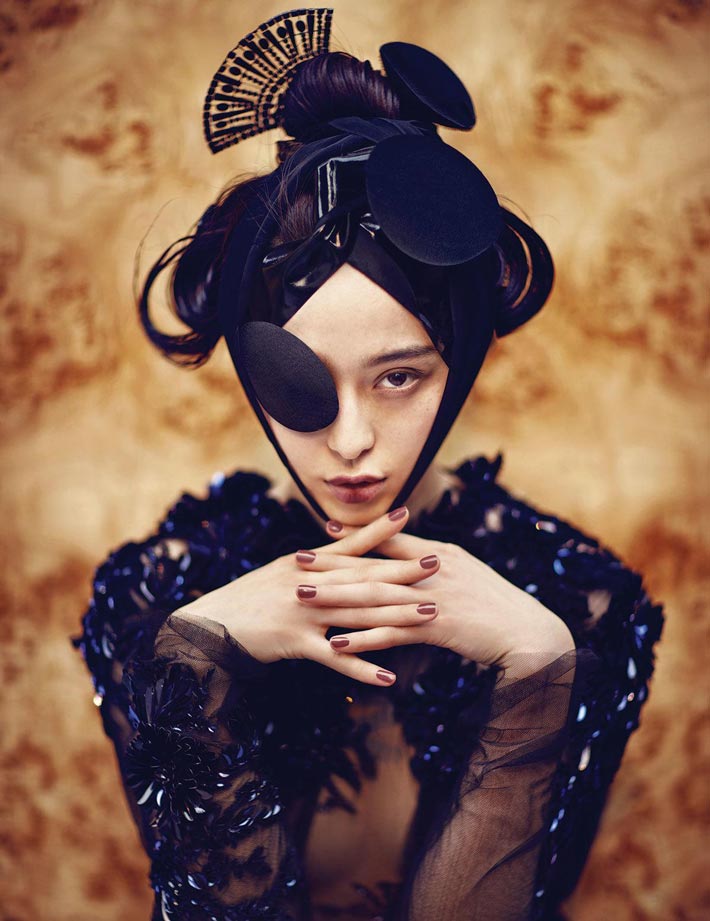Photographer Chen Man is often described as China’s Annie Leibovitz. But her personal hero is Michael Jackson, and she is just as hard to define.

In Chen Man's early shoot "Skateboard Girls" (2007), unknown Chinese skateboarders stand nonchalantly next to unclothed models who are coyly covering themselves with skate decks. "I've been a photographer for over 13 years and in the beginning, in China, we didn't have any stylists," she explained to me last weekend. "You can tell because, back then, a lot of my models were nude!"
We were speaking at the China Fashion Gala in New York, at which Chen was being honored for her wide-ranging and progressive contributions to the fashion and art worlds. She has, it's been said, single-handedly started a visual revolution in China, embodying the country's clash of tradition and modernity in her immaculately staged and often wildly fantastical images.
She is perhaps best known as a portrait photographer. When Harper's Bazaar China landed a Rihanna cover story in March 2015, Chen shot the feature (Rihanna, dressed in Dior haute couture and a cherry-blossom-like headdress, wanted "an Asian look," said Chen). Six months later, in August 2015, Chen appeared on the cover of the very same magazine, becoming the first photographer ever to do so. Somehow, in the process of shooting celebrities (from Nicole Kidman to Fan Bingbing), Chen has become a celebrity herself.
She has created a line of makeup for M.A.C., designed her own calligraphed Beats headphones, appeared (covered in baby animals) in the ad campaign for her ongoing collaboration with Canon, and walked the red carpets at Cannes and the Met Gala. This year, she is developing a movie script. So perhaps it's unsurprising that Chen told the audience at the China Fashion Gala that her personal hero is Michael Jackson — an artist who fought tirelessly to break down creative boundaries. "The people in the fashion industry or art industry cannot define me," she said.
Chen was born in Beijing in 1980, just as China was reforming its economy and beginning to open to the west, a transition that continues to shape her work. She took part-time jobs during college so that she could afford Photoshop, while her friends, she jokes, saved for handbags. It paid off; her expertise in post-production made her work stand out from her peers' at school. That, and her artistic sensibility. Since childhood, Chen has practiced traditional Chinese painting and echoes of its curlicued brushstrokes are visible everywhere in her images (see: the wisps of bright red hair across Victoria Beckham's face in their shoot together). Her highly stylized approach to photography often feels like a kind of Photoshop painting. In one of her best-known early images, "Astronaut," a model's head is encased in a glass bubble suspended in the clouds, a tear rolling down her cheek as a rocket passes by. The photograph was recently acquired by the Victoria and Albert Museum.
The surreal gloss of many of Chen's images has also inspired the title "the Mario Testino of China." But Chen is very much a Chinese photographer making images of her China. She is Chen Man. "People have this misconception that [the Chinese] have replicated what we think is the Western world, but the Chinese fashion industry is awakening to its own identity nowadays," she told Business of Fashion in 2015. "We're a generation that witnessed reform, a generation that's now witnessing the material dream coming true. What influences me most is this reality. I want to create a visual elaboration of traditional Chinese culture from this perspective." Her iconic series "Funky Great Wall" (2007), for example, shows the model Lv Yan (who was famously mocked for her otherworldly appearance in her native China) posing with a boombox on the nation's most recognizable landmark.
Chen has also collaborated with i-D three times. "Meeting people from i-D is like seeing family," she told me when we spoke last weekend. Terry Jones first asked Chen to come on as a special editor for the pre-fall 2012 Just Kids Issue, and she photographed "different groups of young Chinese people who I think are the future of China," ranging from punk musicians to the staff of a vegetarian restaurant and the entire Chinese Olympic basketball team (all winking, of course). For The Whatever The Weather Issue (pre-spring 2013), she photographed Tibetan teens, and for her series "China 12 Colors," she shot young representatives of 12 different Chinese ethnic tribes. ("We're a bit like America actually: we have 56 different tribes in China, and the languages are different," she explained.)
For the Just Kids portfolio, Chen decided not to retouch her subjects, "which I think was really interesting to balance out my label as a big retoucher in China!" she laughed. Her knack for retouching inspired several questions at a Q&A during the China Fashion Gala. Moderator Joe Zee asked if it creates misleading images of unattainable perfection. Chen acknowledged the controversy surrounding post-production, adding the she feels less compelled to retouch for Western publications than for magazines in China, where ideals of physical perfection are more prescriptive. "The thing is we are not so perfect. That is beauty," she added, "You have to accept imperfect. That is perfect."
Chen sees her country's fascination with flawless visuals as a side effect of its multiplying screens. When I asked her what the biggest youth trend in China is today, she said, "It's all about mobile phones. Every day a ton of new apps come out. So I think every young person has two lives: one in their phone, one in reality. I think that's interesting." Chen is building an app herself, which she'll release next year. "It's about short videos and communicating through visual language," she revealed. "It's totally new."
Source: i-d.vice.com
